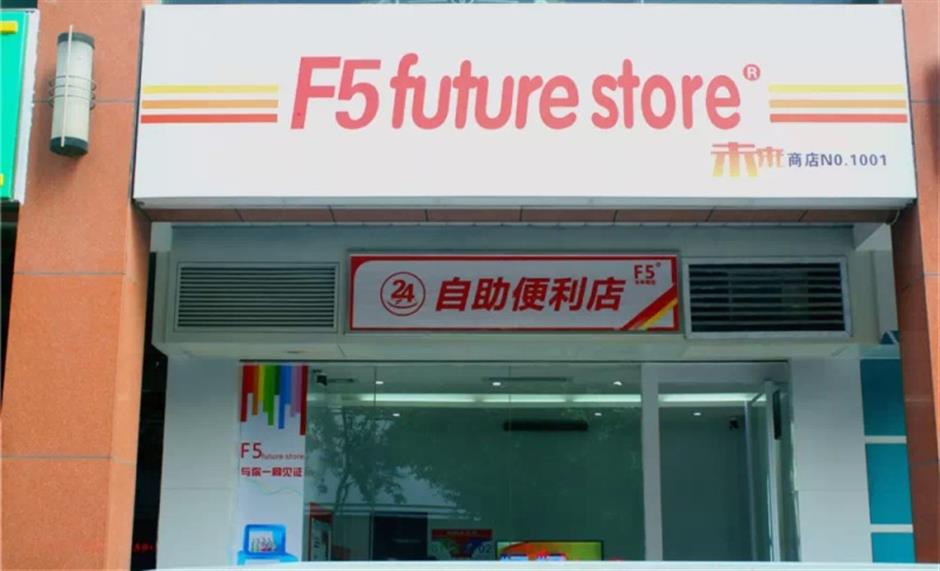No more cashiers. Is it all too dehumanizing?
New business models have popped up in response to the expanding numbers of people forsaking cash in favor of paying for goods and services via mobile devices.
Among the most eye-catching innovations are supermarkets with no cashiers. This new business model, appearing across a number of China's major cities, is causing some to wonder what it all means for the future of retailing.
For merchants, it portends fewer workers and lower costs. For consumers, it means the absence of sometimes annoying shop clerks. But for others, it presents the unsettling prospect of human contact being eliminated from yet another aspect of daily life.
Ye Hu, a Shanghai office worker, is not a fan of BingoBox, a new chain of cashless stores. She said her smartphone is already used for multiple purposes, and adding yet another app to shop in a small convenience-style store hardly seems worth the effort.
"Going to a regular convenience store or nearby grocery is a bit more straightforward for me," she said.
Another Shanghai resident surnamed Chen said she once entered a BingoBox shop to buy some yoghurt but said she won't be going back. The products are easier to purchase at nearby supermarkets or vending machines, she said.
The 15-square-meter BingoBox outlets in Shanghai require customers to use their smartphones to unlock entry doors and pay for merchandise via apps. Radio frequency identification labels are deployed to enable automatic detection of each product's price at the checkout area.
Some call BingoBox just an enlarged vending machine. But unlike standard vending machines that sell only beverages and snacks, BingoBox outlets also stock daily necessities, stationery and fresh fruit.
The checkout process requires users to scan a QR code for each product purchased. After payment is verified, which can take half a minute, the door automatically opens for exit.
The Guangdong Province-based company is betting big on this new business model. After trialing the cashless concept in Guangdong for several months, it expanded nationwide. BingoBox claims to have 5,000 outlets across China and said it raised 100 million yuan (US$14.7 million) in venture capital last month.
Whether consumers are embracing the new trend or not, investors seem captivated by it.
Chuangshanghui E-commerce, operator of unmanned convenience store chain F5 Future Store, raised 30 million yuan at the end of June from Sinovation Ventures, backed by former Google China head Kaifu Lee.

F5 convenience store in Foshan, Guangdong Province.
The F5 stores sell not only beverages and packaged foods but also ready-made noodles and hot drinks served up a robotic arm.
Independent market observer Xiao Mingchao said unmanned stores in their initial stages require hefty upfront investment that may be hard to recoup.
“Only by operating on a large scale can operators cut cost and raise efficiency,” he noted.
Alibaba showcased its entry into the trend -- an unmanned supermarket and coffee shop called Tao Café -- as a part of the recent Taobao Maker Festival. Tao Café is in trial status.
The café incorporates elements such as target tracking, sensor chips and machine-learning algorithms that remember each visitor’s whereabouts within the shop.
By logging into Taobao or an Alipay account before entering the shop, customers pay for services without staff assistance. The beverage area of Tao Café has a voice recognition function to take orders from customers. The only humans employed in the café are merchandise stockers, who remain out of sight.

Tao Cafe ran on a trial basis in Hangzhou in early July.
Alibaba Chief Executive Officer Daniel Zhang said this new brand of marketing relies on technology that could become standard infrastructure for retailers in the future, regardless of the businesses they operate. The new technology offers greater efficiency and cost-savings., according to Alibaba.
E-commerce giants and tech start-ups are talking up the benefits to consumers, though the public so far remains wary.
In Shanghai, BingoBox's two existing locations are far from the heavy foot traffic of Metro stations and major office buildings. They are competing with the 2,000 convenience stores currently open across the city.
The concern persists that cashier-free stores rely too much on technology and pay too little attention to selection range and attractive displays.
The new trend comes at a time when offline and online retail sectors are beginning to converge. Industrial Securities pointed out in a research note that most Internet companies entering the offline retail sector are aiming to use the collection of consumer data there to benefit their online sales.
Bricks-and-mortar retailers are also realizing that they need to create new, more exciting leisure experiences for consumers, such as dining facilities and dazzling displays.
For now, it’s all a bit of trial and error. Business models need to change and research on how people shop in daily reality needs to be conducted.
How services like Tao Café will fare among the broad public remains to be seen. Questions remain. How, for example, can sensors and other technical support systems cope if a large number of consumers arrives at the same, small unmanned shop at the same time? An even bigger concern is the perception that unmanned retail shopping may be just too dehumanizing in a world where person-to-person contact seems to be slowly fading.
There are also issues related to payments from travelers or foreigners, who have to go through some trouble to access China's domestic mobile payment systems that usually require links with a domestic bank account.
Then, too, smartphone data connection in some areas is poor, and technical glitches can create problems for consumers wanting to pay for goods.















